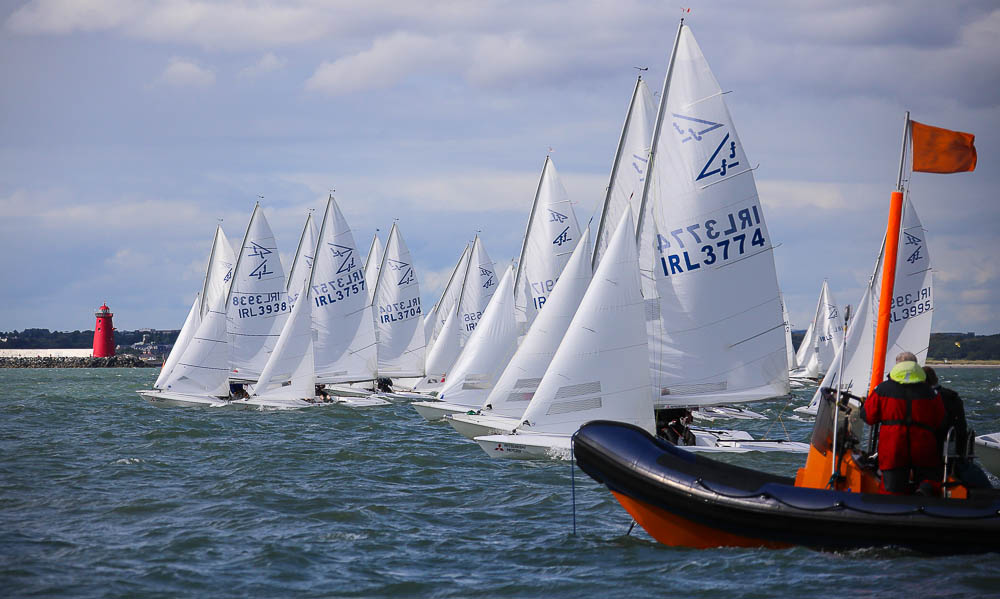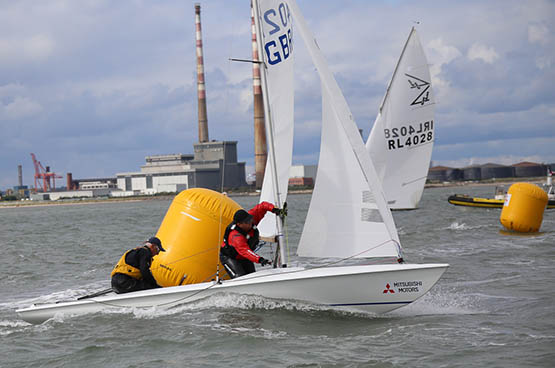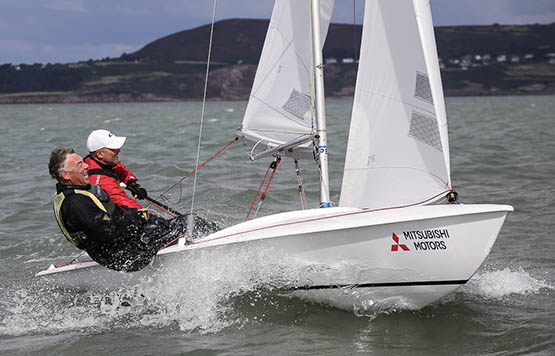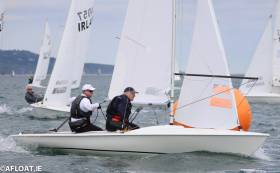Displaying items by tag: Chris Doorly
Very few sailors can ever have experienced anything comparable to the elation of discovering that their racing pride-and-joy has been declared “Boat of the Week” from within the 498-boat fleet at Ireland’s biggest regatta.
But this is what happened to David Gorman and Chris Doorly of the National Yacht Club when their clear overall victory in the large Flying Fifteen class was declared the event’s peak of achievement at the marathon prize-giving at the conclusion of Volvo Dun Laoghaire Regatta 2019, making them unrivalled for the accolade of Afloat.ie “Sailors of the Month (Senior)” for July.
Flying fifteen Pair David Gorman & Chris Doorly Are Afloat.ie Sailors Of The Month For September
Dave Gorman and Chris Doorly of the National Yacht Club are our “Sailors of the Month” for September on the basis of a great half hour or so of sailing in Dublin Bay on the morning of Sunday 13th September.
Anyone who read Chris Doorly’s riveting account on Afloat.ie of the penultimate race of the Mitsubishi Motors Flying Fifteen Championship, and has raced a sailing boat at any level – whether local, regional, national or international – will have identified totally with this dedicated duo as they sailed their hearts out. And they did it all just to secure a third place, in order to put themselves in the happy position of knowing they were champions without having to sail the last race.
It would be quite something in a club race or a major regatta series. But this was the big one, the Irish Championship with visiting superstar Steve Goacher – three times World Champion – expected to sweep the board. And even if he was off form – which he wasn’t - the class in Dun Laoghaire is now in such vibrant condition, and growing, that the lively home fleet was putting up half a dozen crews who were in there with more than a shout.
But Chris and Dave did it. And being proper sportsmen, they stil sailed the last race anyway, but the fact that they were able to discard the fourth place it provided shows the kind of form they’d been in throughout the championship.
It cannot be said too often that winning a series is more a matter of solid consistency than occasional flashes of total brilliance. In the end, though, it can all come down to something so mundane as securing a third place at just the right time. But as Dave and Chris had been lying sixth until they realized the need to up their game, and saw a way of doing so, what they achieved is something we can all identify with, making them ideal “Sailors of the Month”.
How We Won The Flying Fifteen Irish Championships 2015
As Afloat.ie reported on Sunday, David Gorman and Chris Doorly of the National Yacht Club won the 32–boat Mitsubishi Motors Flying Fifteen Championships of Ireland at the weekend beating a visiting triple world champion in the process. Here Chris Doorly describes how the cup was won.
The Notice of Race for National Championships should carry a health warning, both for physical and mental well being! Going up the last beat of Race 6 on Sunday morning we were in sixth place, we needed to be third to win the event and avoid sailing the last race (quiet a luxury really!) The legs were burning, the wind was fickle and the mind was playing games on us, were we going to lose out and leave it all to the last race?

The 32–boat championship fleet start race five
It was not a pleasant thought, patience and calmness were the order of the day, we checked in with our inner mind and settled down to just do what we always do, stick to the process just like the rugby lads! Soon after the leeward gate we got past Brian O’Neill and then Tom Murphy, up to fourth, would it be enough, Dave thought it might be. Last year’s winners Andy and Dougie were in good form today and it was far from a given that we would pass them.
As we approached the weather mark Steve Goacher was leading followed by Sean Craig, we watched the water for pressure it was now light in most places, where would the wind come from next? we saw texture on the water to the right and noticed Steve had a bit more pressure, also at the right as he rounded the mark, we took the risk and went in on port to the right side, on the lay line we tacked and we crossed the lads, third place! Downwind the wind was still light and all over the place, it was a long 1.2 miles to the gate and finish! There was total concentration on the spinnaker. We stayed close to them deliberately, or were they staying close to us waiting to pounce? We just managed to stay ahead gybing at the leeward mark on the inside and crossing the line in third, we had done it! There was great delight on board so much so that some on the committee boat were wondering why we were celebrating after getting third in a race!

Steve Goacher and Martin Grady prepare for a hoist
It was a three day event with racing starting on Friday, we like the three day events as we tend to go well in all conditions and are not heavy or light weather specialists. In the build up we would have been considered one of the favourites, a tag that means very little in sailing, but with the entry of Steve Goacher and Sean Craig our expectations were dampened but we were determined to give it our best shot.
There was a severe weather forecast for Saturday in particular and it was blowing over 20knots on Friday at the briefing. International race officer Jack Roy and his team put on three races on Friday in case Saturday got cancelled. On the water the 20knots had disappeared and Jack put up the AP. Eventually we got going, there was a general recall on the first start but on the restart the pin was biased and we nailed it, this was critical as the boats at the pin end were the lead boats for the race, Steve led the way at the weather mark and to our surprise we passed him downwind just before the gate, our joy and confidence boost were short lived as the tide pushed us up against the mark and we had to do our turns, we carried on finishing second to Steve with Brian Willis third and Sean Craig fourth, it was good to start with a counter.

Sean Craig and Alan Green finished third overall
In racing you need a little luck, in race 2 in light conditions we finished second as we were out on what ended up the favoured left side, some would call it the windier side, with Sean Craig who won the race, Steve was on the right and got caught out to finish seventh. Similarly in Race 5 on Saturday in the westerly winds we had spotted wind on the right and got a fantastic 20 degree lift up to the mark as our competitors were on the left side, we went on to win this Race while Sean was fourth and Steve fifth. In saying that we aware that while left into the shore generally pays it was not always the case and our eyes were scanning the course for wind. On Saturday night we had a four point lead but from previous experience we knew that it may not be enough but were delighted to be in the lead and in contention.
Roll on race six on Sunday where we managed the required third place to take the cup back to the National Yacht Club. Race seven was windier with some exhilarating downwind sailing to round of a fantastic weekend of sailing. Again Goacher and Craig didn’t have it all their own way as local boys Ian Mathews & Keith Poole and last years champions Andy McCleery & Colin Dougan took off to be first and second with Steve third, Sean piped us on the line to take fourth place but this was to be our discard.
Thanks to Jack Roy and his race team, the race office, the National Yacht Club and to the local class captain Ronan Beirne along with all the competitors who all did a great job ensuring the success of this event.






























































